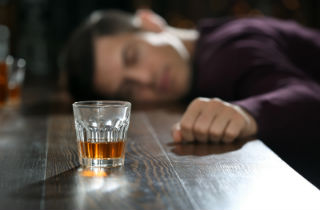Yes, alcohol withdrawal can result in death. However, death is usually caused by a primary disease process or events that accompany acute alcohol withdrawal. It is these complications, especially if the body is in very poor health, that can cause significant illness and death.
However, most cases of alcohol withdrawal are routine and can be treated in outpatient health care settings. In fact, fewer than 20% of people going through alcohol withdrawal require admission to an inpatient unit. When is alcohol withdrawal life threatening and what can you do about it? We review here.
When is alcohol withdrawal life threatening?
Most people experience mild to moderate alcohol withdrawal symptoms. It is generally the severe cases of alcohol dependence that lead to fatal consequences. In fact, there are some cases of alcohol withdrawal which require special medical attention and under no conditions should you consider cold turkey stopping drinking. These include conditions that could complicate the withdrawal process such as:
- co-occurring medical illness
- severe psychiatric disorders
- multiple past detoxification from alcohol
- past history of alcohol withdrawal seizures
- past history of delirium tremens (DTs)
- past history of severe withdrawal symptoms
Medical complications during alcohol withdrawal
Other medical complications can occur during alcohol withdrawal. If doctors suspect that you may experience any of the following complications, hospitalization and intensive care may be required.
- cardiomyopathy (dilation of the heart with ineffective pumping)
- encephalopathy (generalized impaired brain functioning)
- gastrointestinal bleeding
- hypoglycemia
- infection(s)
- liver failure
- pancreatitis (inflammation of the pancreas)
- undetected trauma
Reducing risk during alcohol withdrawal
The best thing to do if you are considering getting alcohol out of your body is to do so under medical supervision. Detox physicians and doctors that specialize in alcoholism treatment can use known protocols to decrease risk of complications or serious symptoms during withdrawal. Doctors not only maintain water and electrolyte balance and correct metabolic disturbances during detox but they can also administer medications to manage withdrawal symptoms. Common medications used during withdrawal from alcohol include:
- adrenergic medications
- antipsychotic medicines
- antiseizure medications
- benzodiazepines
Medical care is crucial if you have been drinking large amounts of alcohol for long periods of time. Keep in mind that death and disability may result from DTs or seizures without medical care. So, seek professional help any time that you would like to treat alcohol dependence, especially more severe cases.
Tips for alcohol withdrawal
If you are planning to go through an alcohol detoxification, be sure that you have a sober friend or loved one who can be a reliable support person. Emotional support is crucial during alcohol withdrawal, and will help you get over the most uncomfortable phases of withdrawal. Medications that help you stop drinking are available after you withdraw from alcohol and can help you manage mood disorders and cravings associated with alcohol use.









Related Posts